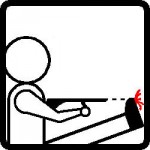 We live in a world with a million possible distractions, pressures, emergencies and interruptions – how can you possibly stay focused on your goals and sane?
We live in a world with a million possible distractions, pressures, emergencies and interruptions – how can you possibly stay focused on your goals and sane?
There are always going to be several things constantly competing for your time – marketing campaigns to design, team members to manage, customers to respond to, business opportunities to explore, issues to follow up, personal commitments etc. However, whenever you try to work on too many things at the same time, inevitably none of them ever gets done. Business success often comes down to focus.
To assist my clients in staying on track and keeping things simple, I developed the following list of 5 simple techniques/questions to put things into perspective. When in doubt – check the list for guidance.
1. Has Anyone Died? If not, relax and calm down. As long as no one has died, it’s really not that serious and there is a solution to every challenge you face.
2. Are You Trying to Eat an Elephant in One Sitting? Breaking things into bite sized chunks makes the world of difference. Having broad high level goals are good but having an actionable plan is essential. A detailed, step by step plan can help you to identify how you can get from where you are to where you want to be. Remember, a journey of 1000 miles begins with one step.
3. Are You In A Bad Neighbourhood? If you are not in a good place emotionally, change your physiology immediately. That means get up and get moving, put on your favourite song or do the “dance of joy”. Whatever it takes, do it NOW.
4. Are You Grateful For What You Already Have? It is impossible to bring more of what you want into your life if you are feeling ungrateful about what you already have. It has been said that the whole is more than the sum of its parts. In many ways gratitude is a bit like that – it’s not what you say, the mere words that count, but sum of the words and the heartfelt emotion behind them.
5. Are You focused on What You Want or Don’t Want? Whether we realise it or not, we are visualising things all the time – visualising either what we want or don’t want. If you are relentlessly focused on the negative outcome and are riddled by fear that WILL impact your reality.
It’s very easy to get so caught up in the emotion of emergencies, disruptions and day to day activities that you can easily lose sight of what is most important to your business success and well-being. These simple tips and questions will help you stay more in touch which is what is most essential to you and your compelling future. These techniques (and keeping a sense of humour) are vital to helping you to stay in focus with your ultimate goals and business success.
Article Source: http://EzineArticles.com/2314715
Life isn’t always easy – there can be no question about that. It’s unpredictable and it’s often hard to make sense of what happens. Some of the events in our journey end up being nothing more than minor irritants, while others are more like being hit by a Mack truck at 200 kph.
Regardless – we have to play the hand we are dealt.
Part of the process of coming to terms with whatever occurs in your life is to find a way to make sense of it. If science indicates that objective reality doesn’t actually exist, it is very much up to us to create a reality that helps us move on and find some meaning. As W Mitchell so accurately points out, ‘It’s not what happens to you, it’s what you do about it that matters’.
I like to think of it as choosing to ‘make chicken soup out of chicken shit’. And it is often in these times of desperation or perspiration that we accomplish our greatest achievements. We play the hand that we have been dealt and in so doing we stretch beyond the finite boundaries of probability and skill into the realm of possibility and inspiration.
For Christopher Reeve a random riding accident changed his life. Everything he was in terms of his career and how people perceived him vanished the instant he hit the ground. And yet he was able to muster his resources and master his own mind so as to find a reason to carry on. I’m sure becoming paralysed was not part of his life plan. I’m sure there must have been times that he was angry and bitter, but these feelings obviously didn’t consume him.
The simple truth is that Christopher Reeves found himself in a wheelchair at just 43 years old. Nothing could be done to change that. There was no way to wind back the clock and no way to repair the damage. His condition was permanent. But his state of mind and any negative emotions he felt were temporary and 100% within his control. He had two options: (1) let the event consume his life and extinguish his spirit or (2) accept his condition and make the best use of his time and influence to advance science in the hope that someday others with spinal cord injuries might walk again. In many ways, he became more of a superhero after his accident than he had previously been in his film roles because he created a vision and a purpose that was bigger than the event that changed his life.
He accepted the cards he was dealt in the game of life and he played with the courage, determination and strength of character of a superhero. Perhaps Christopher himself said it best, ‘I think a hero is an ordinary individual who finds the strength to persevere and endure in spite of overwhelming obstacles. They are the real heroes, and so are the families and friends who have stood by them.’
TODAY – is the perfect time for you to stand back and celebrate the superhero within yourself and others. If you choose to play the hand you’ve been dealt to the best of your ability…I think you will look back [someday] and agree that the “game” was worthwhile.
Article Source: http://EzineArticles.com/2314703
09 Nov 2011
8 Ways You Sabotage Your Own Success in Business
As a business owner, I’ll bet you’re incredibly busy and find that there never seems to be enough hours in the day to complete all your work.
Have you ever noticed that some of your everyday activities are just deeply ingrained habits – driving your car, putting on your watch, brushing your teeth or taking a shower? You wouldn’t dream of not doing them, they are part of your routine and they just seem to happen automatically. In your business you also have habits such as checking your website, opening the mail, reading emails, grabbing a coffee and glancing at your diary. You do them without conscious “thought” and they seem to fill up hours in your day…
But what about all the actions you need to take in order to build a more profitable and efficient business? Like following up with your best customers, asking for referrals, strategic planning and goal setting to grow your business? When do you do these activities? Do they often get relegated to “tomorrow” or “sometime soon”?
If you’ve ever spent your day stuck in back to back meetings, answering routine questions from your team, responding to emails, helping other people, doing paperwork or tidying your office – you already know that these are “make busy” activities, and they will keep you trapped where you already are – just simply maintaining, not growing your business. By filling your days with these tasks, you are in effect avoiding the very activities that you know will really move your business forward and produce tangible results.
Your “make busy” work or habits create the magnificent illusion that you are hard at work, simply because you feel “flat out” and your day is full of tasks. Let’s be honest, you would actually rather do anything than face the activities you know would radically accelerate your business success NOW! In fact, you often get to the end of the day and say to yourself “It’s OK, I was really busy, I’ll just get to that marketing plan tomorrow.” Or “I just couldn’t find the time today to make that seminar on leadership or customer loyalty.”
If you are waiting for the right or best time to do these critical activities in your business, it will simply never come! There will always be other “busy work” to fill all of your available time. You need to find a way to make your business building activities an ingrained habit too, if you want to grow your bottom line and live the lifestyle of your dreams.
Do you relate to or identify with any of these common sabotage habits?
1. Perfectionism – this tactic is insidious. It often immobilizes us from making a decision, starting a project or activity and signing off on a piece of important work. Most tasks don’t have to be 100% perfect, they just need to be good enough. The other way that this can show up is when you deceive yourself into believing that no-one else can do the job (even simple routine tasks) to your exacting standard, so you must do it ALL yourself. Follow the 80/20 rule, delegate what you do not have to do yourself and give yourself permission to be human!
2. Refusing to Let Go of The Past – Have you ever heard yourself say “last time I tried that, it didn’t work”? Or have you ever simply avoided doing something that you know you should or need to do but were afraid to do because “last time it didn’t work out the way you wanted it to”? Even though it’s a good idea to stop doing what clearly doesn’t work, it’s important to remember that the past does not necessarily equal the future. If you catch yourself finding reasons from the past to justify why you are not moving ahead toward your compelling future, stop NOW and take a good hard look at whether these are just cleverly disguised forms of self-sabotage.
3. Lack of Accountability – who is holding you accountable to the decisions you make and the actions you take in your own company? Isn’t that why you went into business for yourself in the first place – so that you could be the boss and do things your way? Find someone outside your business – a coach, mentor or trusted advisor that can act as a sounding board and hold you accountable to staying on track.
4. Lack of vision, planning and specificity – if you don’t know where you are going, how will you know when you get there? Enough said. If you don’t have a 90 day, 1 year and 3 year business plan, you need to make this your number one priority in your business. Set a weekend aside and find a place where you will not be disturbed by anyone or anything. Set down your goals clearly and succinctly – get clear about the specifics (who, what, where, when and why) and set realistic deadlines for completion. Goals need to be written down in detail to allow your mind – which is a goal seeking mechanism – to do its magic.
5. Lack of focus – stay focused on the important task you are currently working on and only allow yourself to be diverted by real emergencies.
6. Fear of Financials – you cannot have a truly successful business if you don’t know your numbers. Not knowing your numbers has already cost you time and money. Find someone who can explain your financials to you in plain English – learn the key drivers and indexes in your business (such as break even, productivity ratios, inventory turns, gross profit margins etc.) and track them daily.
7. No USP – the greatest product or service in the world will not sell if you have not clearly defined why someone should buy from you instead of your competitors. “Build it and they will come is a fallacy.” If you have not yet figured out what is unique about your product or service and found a compelling and cost effective way to communicate it in everything you do, you are literally flushing your marketing budget down the toilette.
8. No Testing and Measuring – this is the most-often overlooked activity by small business owners. The simple act of testing and measuring everything in your business…and I mean everything…will save you thousands of dollars this year. No matter what “it” is, if you haven’t tested and measured “it”, you don’t really know if “it” works. And until you know if it works, you don’t have a reliable, predictable business that will run without out.
Unfortunately, there are no quick fixes. As you already know or suspect, some of the most common forms of self-sabotage are habits because they are deeply ingrained behaviours that take time to establish or eliminate. In the 1960’s a highly regarded plastic surgeon, Dr. Maxwell Maltz discovered that it took 21 days for amputees to cease feeling phantom sensations in their amputated limb. From further observations and significant research he established that it takes 21 days to create a new habit.
Brain circuits take engrams (which are essentially “memory traces”) and produce neuroconnections and neuropathways only if they are bombarded for 21 days in a row. This means that our brain does not accept new data or information for a change of habit unless it is repeated each day (without fail) for at least 21 days. Changing habits (whether positive or negative) can be done but it takes time and consistent effort.
Do yourself a favour and identify today which form of self-sabotage is the primary one that is holding you back from having the business and lifestyle of your dreams. Make a plan on paper – specific decisions and actions that you can take to move forward in this aspect every single day for the next month. It is imperative to track your progress each day and I highly recommend finding an objective person outside of your business to hold you accountable to your plan, actions and results.
17 Oct 2011
What’s The Best Way to Break a Bad Habit?
Without a doubt, the number #1 question I get asked by clients is ‘how do I break a bad habit like procrastination, worry, insomnia, negative thinking or smoking’? There are a million examples of ways that each one of us holds our own success back by ‘doing’ unproductive habits. To make lasting change to deeply ingrained bad habits using willpower and positive affirmations alone is not realistic.
Everyone knows that positive thinking is undependable and produces inconsistent results, at best. The self-image on the other hand underpins our level of emotional intelligence (EQ), which is now recognised as being an even more important measurement for success than the IQ. It has been scientifically proven that our brain circuits take engrams or memory traces, and produce neuro connections only if they are bombarded with the information for 21 days in a row. This means that our brain does not accept ‘new’ data (ie break a bad habit) unless they are repeated each day for at least 21 days, without missing a day.
If you want to break bad a habit like refusing to let go of the past, spending all your time worrying about what might go wrong, overeating, biting your nails or spending more than you earn, it can be done but it will require consistent effort on your part, every day for at least 21 days. In order to do it, your success rate will improve significantly if you can replace that old habit you no longer need with a good and productive habit that will support you to achieve your goals and find someone to help keep you accountable.
And remember, no matter where you are in your life right now — the choices you have made or the experiences you have had — you can break a bad habit because it is never too late to become the person you were meant to be!
28 Sep 2011
What If You’ve Already Got The Life You Deserve?
 I have been fortunate to discover that there is a reason for all things – even those that are senseless and incomprehensible – and that we have to learn to trust that there is a bigger picture that perhaps we, as mere human beings, can never truly understand.
I have been fortunate to discover that there is a reason for all things – even those that are senseless and incomprehensible – and that we have to learn to trust that there is a bigger picture that perhaps we, as mere human beings, can never truly understand.
What if you’ve already go the life you deserve?
The most beautiful expression of this idea I’ve ever read was in a children’s book ‘Little Soul in the Sun’ by Neil Donald Walsh. In the story, Walsh talks of a Little Soul who wants to be incarnated as a human being to learn ‘forgiveness’. A Friendly Soul agrees to oblige him by incarnating as a person to do something to the Little Soul that will help him learn the lesson of forgiveness. But the Friendly Soul issues a plea of caution and says, ‘at the very moment that I strike you down, please promise me that you will remember who I really am, a Friendly and loving Soul, otherwise we will be doomed to repeat the process over and over again until we get the learnings or until another Little Soul comes down to help us find the way out.’
In other words everything that happens in our life – the good the bad and the just plain ugly is the result of an agreement that we have made at some point in our existence to experience certain things so we can become better human beings and move on to the next lesson. We are all doing the best that we can with the resources that we think we have available. Everything is a learning experience and if viewed from that context, we can become empowered to create a world around us in the likeness of our dreams and wildest imaginations.
Even the really hard stuff happens for a reason. There is no failure, only results.
It isn’t about assigning blame or beating yourself up – it’s about being responsible for your response and deciding how best to move forward and attract the results that you want.
Blaming others – even if it’s legitimate – robs you of your power. It doesn’t help you move on – it’s a complete waste of your time and emotion. Put it in the past and find a way to ensure you never repeat it.
Things don’t change – WE change.
The only way to be the change that you want to see in the world is to take responsibility for the life that you say you want to be living. Regardless of the events and circumstances that have occurred, no answers may be found revelling in excuses.
You are already living the life you deserve and imagine in your mind every day. If you are not happy and you want more, you need to step up and BE more. Otherwise, you are destined to repeat the same experiences over and over until you learn the lesson. Even though it may be a hard pill to swallow, on some level you agreed to experience everything that has happened to you – you did this with the understanding that it would help you to grow and to evolve as a human being.
In fact, you already have the life you deserve (and wanted). It begs the question though – “when are you going to forgive yourself (and others), get the “learnings” and move on to the next important lesson that you have chosen for your evolution?”










